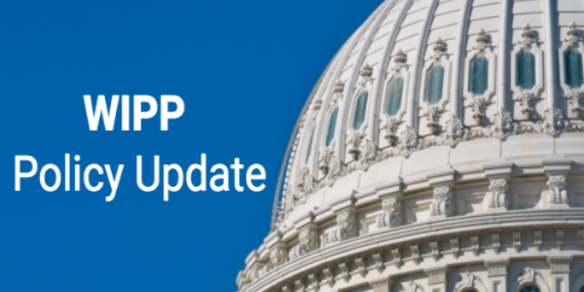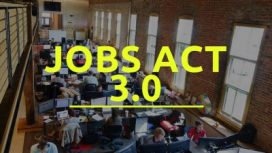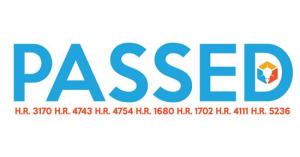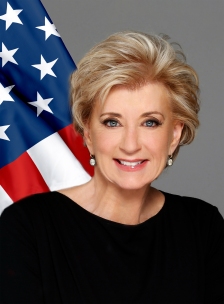
FY2018 Omnibus Spending Package Signed into Law
On March 23, President Donald Trump signed a $1.3 trillion omnibus spending bill for FY2018—10 percent higher than FY2017 due to the budget agreement reached last month by lawmakers.
The Small Business Administration (SBA) received $18 million less than in FY2017. SBA received $247 million for entrepreneurial development grants including $130 million for Small Business Development Centers; $18 million for Women’s Business Centers; and $11.5 million for the SCORE program. SBA’s business loan program will have new authority to guarantee $29 billion in 7(a) loans.
For government contractors, passage of this bill means a compressed procurement and grant cycle. The new Fiscal Year started in October but has just now been funded. That means agencies have one quarter instead of four to procure goods and services.
Here is a chart of WIPP’s FY2018 appropriations requests and what was included in the FY2018 Omnibus bill signed by the president.
FY2018 Entrepreneurship Funding Update
Small Business Administration – Financial Services and General Government Appropriations
| Program |
FY17 Enacted |
FY18 WIPP Requests |
FY18 Omnibus |
| Microloan Program: Lending |
$44 million |
$44 million |
$36 million |
| Microloan Program: TA |
$31 million |
$31 million |
$31 million |
| PRIME |
$5 million |
$10 million |
$5 million |
| Women’s Business Centers |
$18 million |
$21.75 million |
$18 million |
| SBA Office of Advocacy |
$9.22 million |
$9.3 million |
$9.12 million |
Small Business 7(a) Lending Oversight Reform Act of 2018 Unanimously Approved in Both the House & Senate Small Business Committees.
Legislation (H.R.4743/ S.2283) to increase the Small Business Administration’s (SBA) oversight authority over the 7(a) loan program for the purpose of improving the efficiency and reach of the program, passed both the House and Senate Small Business Committees. The Small Business 7(a) Lending Oversight Reform Act of 2018 would:
- Strengthen SBA’s Office of Credit Risk Management by outlining in statute the responsibilities of the office and the requirements of its director
- Enhance SBA’s lender oversight review process, including increasing the office’s enforcement options
- Require SBA to detail its oversight budget and perform a full risk analysis of the program on an annual basis
- Strengthen SBA’s Credit Elsewhere Test by clarifying the factors that must be considered
Read the House Small Business Committee’s Press Release here.
Chabot Supports Bill to Ensure Small Contractors Get Paid Quickly
House Small Business Committee Chair Steve Chabot (R-OH) released a statement recently in support of Rep. Steve Knight’s (R-CA) bill, the Accelerated Payments for Small Businesses Act, encouraging federal agencies to make payments to small business prime contractors within 15 days of sending an invoice.
Read Chair Chabot’s statement here.
National Small Business Week Virtual Conference
SBA has partnered with the SCORE Association to offer a NSBW Virtual Conference which will take place May 1- May 3, between 12:30pm ET and 6:30pm ET each day. The conference will offer 12 educational webinars, mentoring sessions, networking opportunities and resources in a three-day event. You will hear from industry experts, such as Visa, Google, Chase, Constant Contact, Square and more. They will share insider tips on various aspects of online marketing, financing, customer service, cybersecurity among other topics.
Register for the NSBW Virtual Conference here.
SBA Office of Advocacy to Host a Regulatory Reform Roundtable and a NAFTA Outreach Meeting in Atlanta
Next week, the SBA Office of Advocacy will be hosting a Regulatory Reform Roundtable and a NAFTA Modernization Outreach meeting for small business owners in order to gain insight into which specific federal regulatory burdens present the biggest barriers to small business growth and get input on possible NAFTA changes.
Meeting will be held:
- Tuesday, April 10, 2018: Regulatory Reform Roundtable at 8:30am with a special focus on environmental regulatory issues at 2pm
- Location: GTRI Conference Center, 205 14th Street, NW, Atlanta, GA
- Wednesday, April 11, 2018: NAFTA Modernization Outreach meeting at 9:00 a.m. for small business owners.
- Location: Georgia Department of Economic Development, 75 5th Street Northwest, 10th floor, Atlanta, GA.
To register for these meetings, visit SBA’s website.
National Women’s Business Council Releases Reports on Crowdfunding
The National Women’s Business Council released two new research reports on success factors for women business owners access to small business finance, finding that the first 30 days of crowdfunding campaigns matter the most and personal stories play a vital role in reaching fundraising goals. The reports also showed that while it helps to have large network, the way you leverage that network to help you with funding your business is equally important to your success at raising money.
Read the press release and access the reports here.
 In a rare display of bipartisanship, the House of Representatives passed the JOBS and Investor Confidence Act of 2018, known as the JOBS Act 3.0 by a 406-4 vote. The legislation, which was the result of an agreement between House Financial Services Committee Chairman Jeb Hensarling (R-TX) and Ranking Member Maxine Waters (D-CA), includes a package of 32 bills which improve investment, capital formation and lending, with a specific focus on helping small business.
In a rare display of bipartisanship, the House of Representatives passed the JOBS and Investor Confidence Act of 2018, known as the JOBS Act 3.0 by a 406-4 vote. The legislation, which was the result of an agreement between House Financial Services Committee Chairman Jeb Hensarling (R-TX) and Ranking Member Maxine Waters (D-CA), includes a package of 32 bills which improve investment, capital formation and lending, with a specific focus on helping small business.


 rs, creating products and services that are better, smarter or more efficient than what came before. They are risk takers. And through their success, they inspire others to dream and to create small businesses of their own.
rs, creating products and services that are better, smarter or more efficient than what came before. They are risk takers. And through their success, they inspire others to dream and to create small businesses of their own.

 Administered by the Small Business Administration, the 7(a) loan program is a loan guarantee program designed to encourage lenders to provide loans to small businesses that might not be able to otherwise obtain financing. During the first half of FY17, the 7(a) loan program saw an increased demand with approvals 9% higher than in the first half FY16. This lead Congress to include an appropriations provision to increase the program’s authorization limit to $27.5 billion for FY17 from $26.5 billion in FY16.
Administered by the Small Business Administration, the 7(a) loan program is a loan guarantee program designed to encourage lenders to provide loans to small businesses that might not be able to otherwise obtain financing. During the first half of FY17, the 7(a) loan program saw an increased demand with approvals 9% higher than in the first half FY16. This lead Congress to include an appropriations provision to increase the program’s authorization limit to $27.5 billion for FY17 from $26.5 billion in FY16.